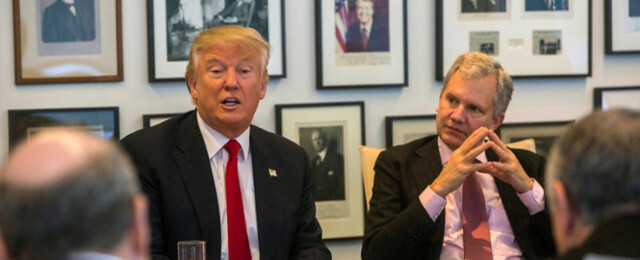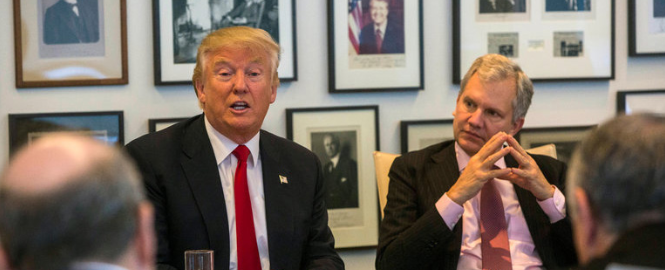
How will a Trump presidency affect the state of the country and the world when it comes to global warming? How will his position on the environment specifically affect Florida, including our precious Everglades, unique coral reefs and beloved endangered species? Florida is one of the states most susceptible to climate change, which is concerning and ironic considering we have a climate denier – or at least someone who refuses to take action against climate change – as Senator and a governor who won’t allow state officials to utter the words “climate change.”
There are things at stake in Florida, things that we will lose if carbon emissions do not begin to decrease. Yet, when it comes to climate change, like many other issues he has recently flip-flopped on, no one is entirely sure where President-elect Donald Trump stands.
Changing positions
Trump has previously said that he wants to cancel the Paris Accords, a landmark agreement that was signed by 190 nations, including the U.S., in December of last year that commits said countries to reducing carbon emissions through national plans. The agreement also created the Green Climate Fund, $100 billion that is meant to go towards helping developing countries develop renewable energy and adjust to the effects of climate change. A source on Trump’s transition team said the President-elect is seeking ways of withdrawing from the Paris Agreement within a year, bypassing a theoretical wait-time of four years, according to an article from Reuters published on Nov. 15.
However, in a recent interview with the New York Times, Trump reportedly refused to repeat his promise to abandon the Paris Agreement saying, “I’m looking at it very closely.” According to the Times, Trump said that he has an open mind to the Paris Agreement and that clean air and “crystal clear water” were vitally important.
Trump also said in the interview that he thinks “there is some connectivity” in terms of human activity causing climate change, but that it depends on how much connectivity and “how much it’s going to cost our companies.”
Contradicting Actions
Despite Trump’s claims to an open mind, he recently appointed Myron Ebell as head of his Environmental Protection Agency (EPA) transition team. Ebell is a leading climate change skeptic and has said he wants to cancel Obama’s Clean Power Plan, the “ambitious centerpiece of Obama’s climate change legacy and the key to his commitment under the Paris accord,” according to the New York Times. The plan is made up of a set of EPA regulations intended to curb planet-warming pollution caused by coal-fired power plants, according to the New York Times.
According to NPR, Ebell said he and his colleagues at the Competitive Enterprise Institute, where he directs the Center for Energy and Environment, agree that “carbon dioxide is a greenhouse gas and that concentrations are increasing as a result of burning coal, oil and natural gas, and that this means the global temperature is likely to rise.” However, they disagree with the idea that global warming is a crisis that requires drastic action. Ebell is reported to believe that climate change may actually be beneficial for the world.
“There is much evidence that the mild global warming that has occurred since the end of the Little Ice Age in the mid-nineteenth century has been largely beneficial for humanity and the biosphere,” Ebell told NPR.
Continuing to fight
During the climate change conference in Marrakech, the follow-up to the talks in Paris, that took place from Nov. 7 to Nov. 18, French President Francois Hollande and U.N. Secretary-General Ban Ki-moon called on Trump to abandon his campaign pledge to cancel the Paris Agreement, according to Reuters.
Although Trump has now changed his position many nations remain worried about the United States pulling out of the Paris Agreement, which experts worry would discourage other countries from pursuing action to cut their fossil fuel emissions.
However, China has said they will continue to work at cutting emissions regardless of what Trump decides to do. Michael R. Bloomberg, former mayor of New York City and staunch supporter of action on climate change, said that American cities would continue to enact climate policies despite Trump’s decision as well.
Mr. Bloomberg spoke at a talk hosted by the China General Chamber of Commerce; his remarks were adapted for an op-ed article published by the Bloomberg View on Nov. 22.
Following is a passage from the op-ed article: “I can’t tell you what Donald Trump’s administration will do… But I am confident that no matter what happens in Washington, no matter what regulations the next administration adopts or rescinds, no matter what laws the next Congress may pass, we will meet the pledges that the U.S. made in Paris.”
Mr. Bloomberg said cities, businesses and citizens will continue to reduce emissions because it is in their self-interest, as it is in China’s self-interest. He added that the progress that has been made in fighting climate change over the years has not been because of Congress but because of cities, businesses and citizens who have fought to do so and will continue to do so.
Mr. Bloomberg said that if President-elect Trump decided to withdraw the United States from the Paris Agreement he would urge the mayors of 128 cities in the United States who see the need to fight climate change to join the agreement, according to the New York Times.
“Mayors and local leaders around the country are determined to keep pushing ahead on climate change,” Bloomberg said in the op-ed.
The same can be said about the countries in attendance at Marrakech who left the conference despite concerning U.S. election results, with a plan to continue implementing what was agreed upon in Paris. COP23 will be hosted by Fiji next May but will take place in Bonn, Germany, where the headquarters of the United Nations Framework Convention on Climate Change (UNFCCC) are. Countries hope that the next conference will further iron out the details of the agreement and will be a chance to assess how countries are doing in regards to their plans to reduce emissions.
Information from this article was gathered from carbonbrief.org, reuters.com, npr.org and nytimes.com.
http://www.nytimes.com/2016/11/11/us/politics/donald-trump-climate-change.html
http://www.nytimes.com/2016/11/23/us/politics/mike-bloomberg-donald-trump-climate-change.html
http://www.nytimes.com/2016/11/22/us/politics/donald-trump-visit.html
http://www.nytimes.com/2016/11/12/science/myron-ebell-trump-epa.html

